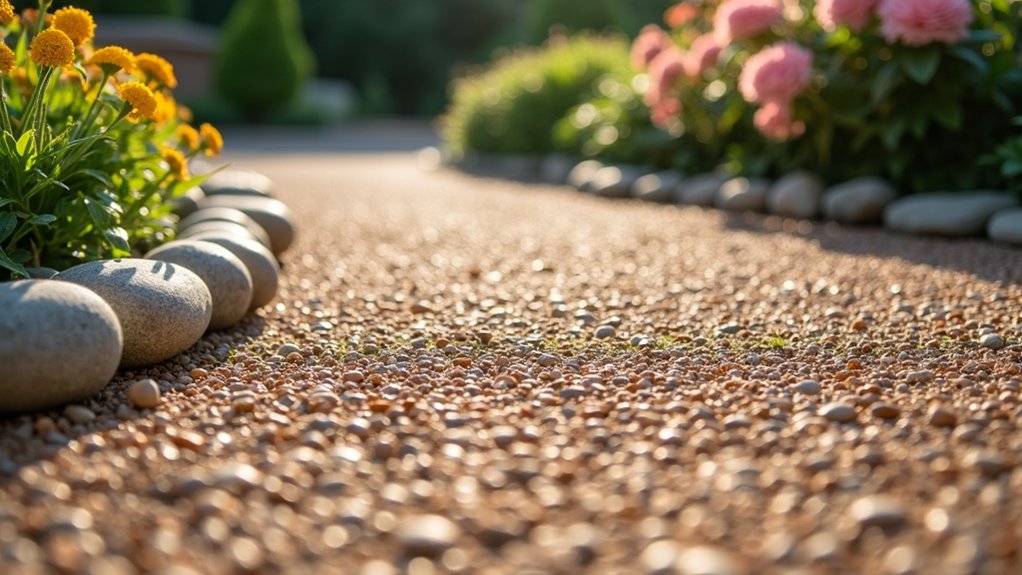Select a timeless resin-bound gravel finish by focusing on classic aggregates and premium resin. Traditional colours like warm beige or natural grey work brilliantly with most British architecture, from Victorian terraces to modern builds. Ensure you choose BBA-certified materials – they’re essential for both longevity and building regulations in the UK. A mix of smooth and angular stones creates visual depth whilst maintaining proper drainage, particularly important for our wet climate. Good installation and basic upkeep will protect your investment and boost your property’s kerb appeal.
Key Takeaways
Best Practices for Long-Lasting Resin-Bound Gravel
- Go for muted, versatile colours like beige, grey or earthy tones that work well with most British house styles and garden designs.
- Pick sturdy aggregates such as Cotswold stone or Scottish granite – they’re proven performers in our climate and look smart for years.
- Ensure your chosen resin has proper UV protection – particularly important for British weather to prevent yellowing and fading in both sun and rain.
- Mix your aggregates thoughtfully – think 70% main colour with 30% complementary stones for a subtle blend that won’t look dated in five years’ time.
- Get a qualified installer who’s BALI or TrustMark registered – proper installation makes the difference between a drive that lasts 15+ years and one that fails after two winters.
Understanding the Benefits of Resin-Bound Gravel
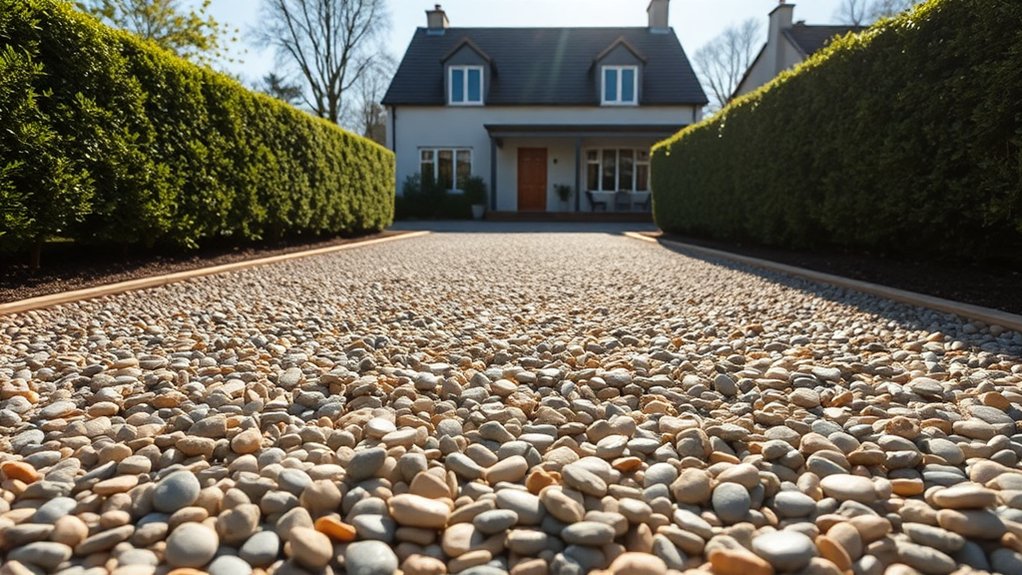
Resin-bound gravel offers a brilliant mix of style and practicality for your outdoor spaces. Its porous surface handles British weather remarkably well, letting rainwater drain naturally and reduce puddles – particularly useful for our wet climate. Think of it as a built-in drainage system that helps prevent waterlogging whilst supporting local wildlife. You’ll find plenty of colour options to match your property, from warm honey tones to classic greys. Unlike traditional gravel that scatters about, resin-bound stays firmly in place, meaning less sweeping and maintenance. It’s tough enough to handle daily foot traffic and harsh weather, making it ideal for driveways, garden paths and patios across the UK. Additionally, its durability allows it to last over 15 years with minimal maintenance, and chemical bonds(chemical bonding) enhance the surface’s strength and longevity, making it a wise long-term investment. The eco-friendly benefits are clear: better drainage means less strain on local water systems during heavy rains, and the permeable surface helps replenish ground water naturally. For a durable, good-looking outdoor surface that’s kind to the environment, resin-bound gravel ticks all the boxes.
Evaluating Material Quality for Longevity
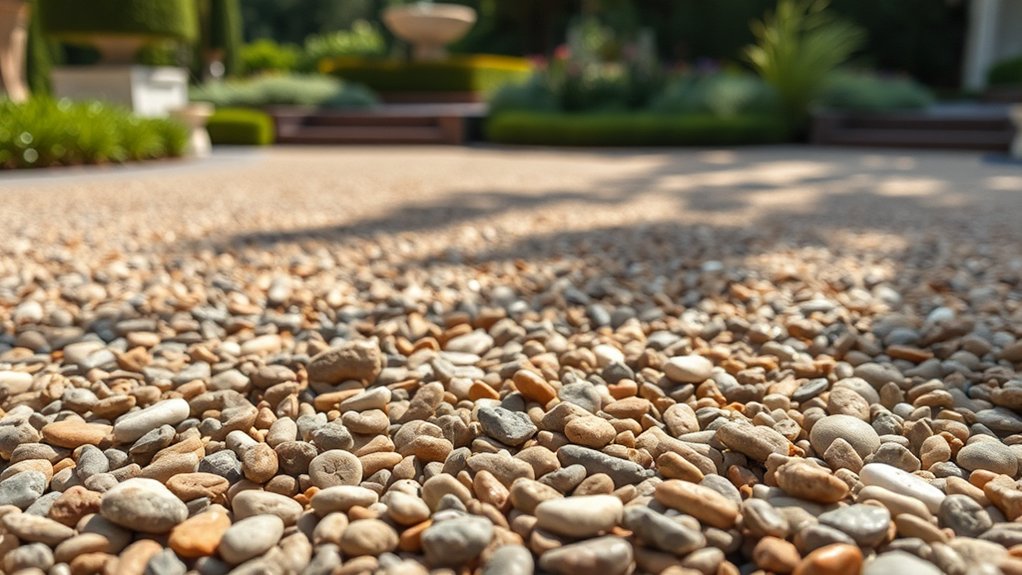
Selecting quality resin-bound gravel is crucial for both looks and longevity in your outdoor space. The secret lies in the materials – you’ll want top-grade resin and spotless aggregates from trusted UK suppliers. Look for products with BBA certification to ensure they meet British standards. The right mix matters too – stick to a 3:1 aggregate-to-resin ratio for proper drainage and lasting performance. Regular audits verify that materials meet REACH regulations to ensure safety and compliance. Additionally, ensuring that your resin-bound gravel is eco-friendly reduces environmental impact while providing superior performance.
| Material Aspect | Importance |
|---|---|
| Resin Selection | Durability & UV stability |
| Aggregate Quality | Clean & dust-free |
| Mixing Ratios | Correct coating |
| Testing Standards | BBA & FeRFA compliance |
| Permeability | SuDS compliance |
Think of it like making a proper cup of tea – the right ingredients in the right proportions make all the difference. Poor quality materials might save money initially but will cost more in repairs down the line. British weather demands surfaces that can handle whatever Mother Nature throws at them, so investing in quality materials is simply good sense.
Exploring Aggregate Options for Aesthetic Appeal
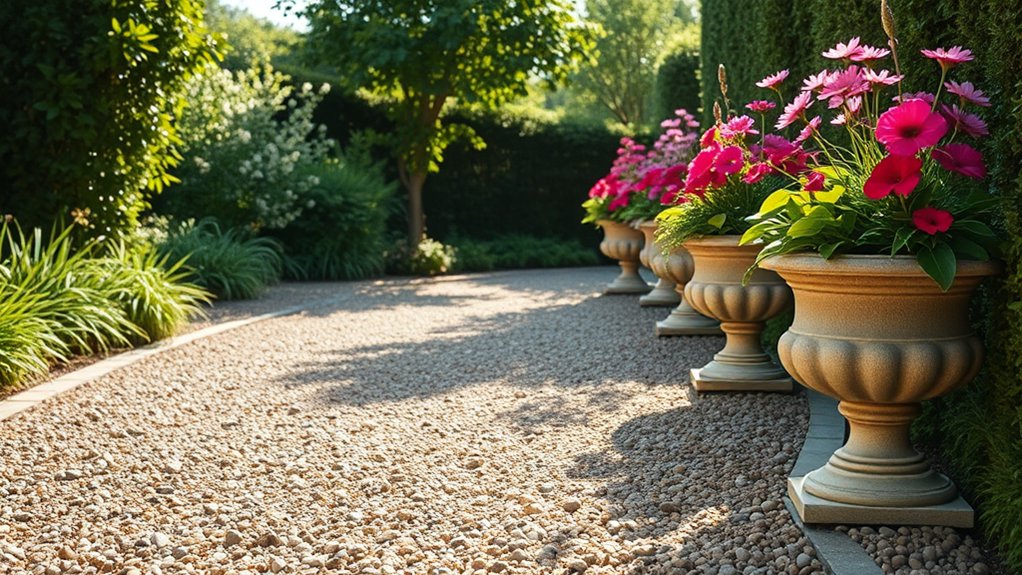
A resin-bound gravel surface can transform your garden or driveway whilst offering practical benefits and visual impact. For the best aesthetic results, mix different aggregate types like quartz, granite and limestone. Each stone brings its own texture and look to the finished surface. Combining both rounded and angular stones creates eye-catching contrast, whilst varying the sizes adds depth and interest. A mix of 2-5mm and 6-10mm aggregates works particularly well for most residential projects. The use of washed, kiln-dried stones ensures optimal bonding and reduces maintenance issues.
The resin-to-stone ratio is crucial – too much resin will mask the natural beauty of the aggregates, whilst too little affects durability. A properly balanced mix ensures the stones remain prominent whilst staying firmly bound. Additionally, a properly prepared base is essential for stability and longevity, ensuring that your resin-bound gravel surface withstands the test of time.
Common colour combinations include warm honey-toned granite with pale limestone, or classic grey quartz with black basalt for a contemporary look. Choose aggregates that complement your property’s existing materials and style.
Choosing the Right Resin for Durability
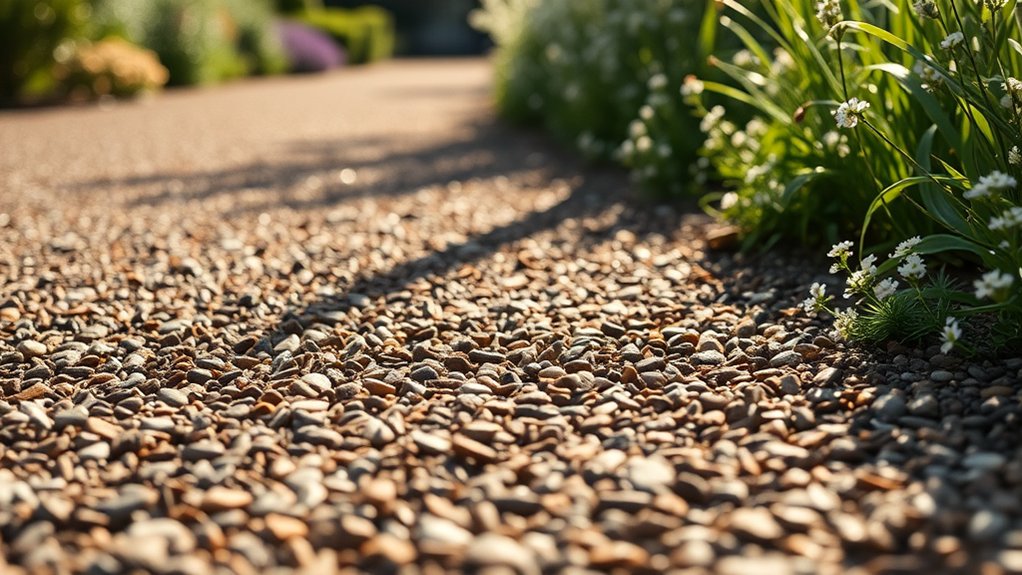
Selecting a durable resin requires careful consideration of different types to match your project needs. UV resistance proves crucial for maintaining both strength and looks, particularly for outdoor applications or items near windows.
Proper mixing and application make all the difference – much like brewing the perfect cup of tea, getting the ratios spot-on ensures the best results.
For outdoor garden projects, epoxy resins with high UV ratings work brilliantly, whilst polyurethane resins might suit indoor furniture better. Think of resin selection like choosing paint for your house – the right type in the right place will last significantly longer.
The key lies in the preparation. Mix your chosen resin precisely according to manufacturer guidelines, as even slight variations can compromise durability.
A well-mixed, properly applied resin should last years, protecting your surface whilst maintaining its appearance.
Resin Types Comparison
Understanding Resin Types
Different resins serve distinct purposes in DIY and industrial projects. Choose based on these key characteristics:
- Epoxy Resin: Crystal-clear finish with straightforward 1:1 mixing. Brilliant for kitchen worktops and heavily-used surfaces.
- Polyurethane Resin: Tough as nails and impact-resistant. Common in factory flooring and warehouse applications.
- Polyester Resin: Stiff and water-resistant, but quite pungent. Less durable than epoxy for outdoor garden furniture and similar projects.
- Heat-Resistant Resin: Withstands high temperatures without warping. Essential for manufacturing moulds and engine components.
UV Resistance Importance
Selecting a UV-resistant resin is crucial for any outdoor project in the UK. Much like suncream protects your skin, proper UV resistance shields your resin surface from our unpredictable British weather.
Quality UV-resistant resins, including leading brands like DALTEX Performance UVR, prevent yellowing and keep colours vibrant – particularly important for garden paths and driveways exposed to direct sunlight.
A well-chosen, UV-stable resin can last 25-30 years with basic maintenance, making it a sound investment for your property. Think of UV resistance as sunglasses for your resin; without it, you’ll notice fading and deterioration much sooner than you’d like.
Mixing and Application Techniques
Getting the Mix Right
Proper mixing and application determine whether your resin-bound gravel will last, even with UV-resistant resin.
Essential steps for a lasting finish:
- Choose premium resin products – cheaper options often lead to weaker bonds and costly repairs
- Use a forced action mixer rather than hand mixing – ensures even distribution and prevents weak spots
- Stick to the manufacturer’s mixing ratios down to the gram – like baking, precision matters
- Build up in layers, much like painting a wall – creates stronger adhesion between coats
Think of it as making a proper cup of tea – the right ingredients and method make all the difference.
Installation Techniques for a Flawless Finish
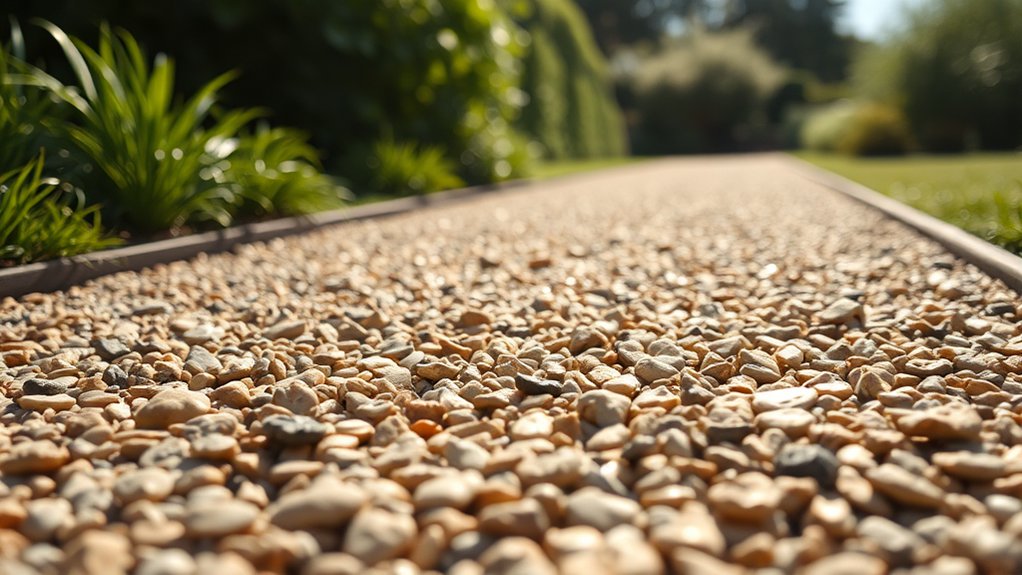
A proper foundation is vital when laying resin-bound gravel.
Whilst DIY might seem tempting, a professional installer ensures the best results, particularly for larger areas.
The key lies in thorough ground preparation and precise mixing ratios – get these right, and you’ll have a robust, good-looking surface that lasts years.
Think of it like building a house: skimp on the foundations, and you’ll face problems down the line.
Professional Installer Importance
Professional Installer Benefits
A skilled installer makes all the difference when fitting resin-bound gravel surfaces. Their expertise ensures proper installation from start to finish, resulting in a durable, properly-bonded surface that lasts.
Consider these key advantages:
- Skilled Labour: Professional teams handle complex layouts and challenging areas with precision
- Proper Equipment: Access to specialist mixers and tools ensures consistent resin blend
- Weather Knowledge: Understanding of ideal conditions for installation and curing
- Gradient Management: Expert handling of slopes to prevent pooling and ensure even coverage
Whilst DIY might seem cost-effective, professional installation is a worthwhile investment for a premium, long-lasting finish that adds value to your property.
Base Preparation Essentials
Proper base prep is vital for a quality resin-bound gravel surface – get it wrong, and you’ll face problems later. First, check your ground’s stable; any shifting soil needs sorting before you start. Give the subgrade a thorough compacting.
For the base itself, opt for concrete or open-graded tarmac (what we’d call porous tarmacadam in the UK). Think about how you’ll use the space – a garden path needs different support than a car park.
Good drainage is crucial in our British weather. Water pooling leads to damage, so install proper drainage channels and ensure the base has the right fall. For sloped areas, work in layers, taking extra care to get even coverage.
Keep an eye on the weather forecast – laying in the rain or extreme heat isn’t ideal. You’ll want dry, mild conditions for the best results.
Follow these basics, and you’ll end up with a solid foundation for your resin-bound surface that’ll last for years.
Adapting to Environmental Factors for Maximum Lifespan
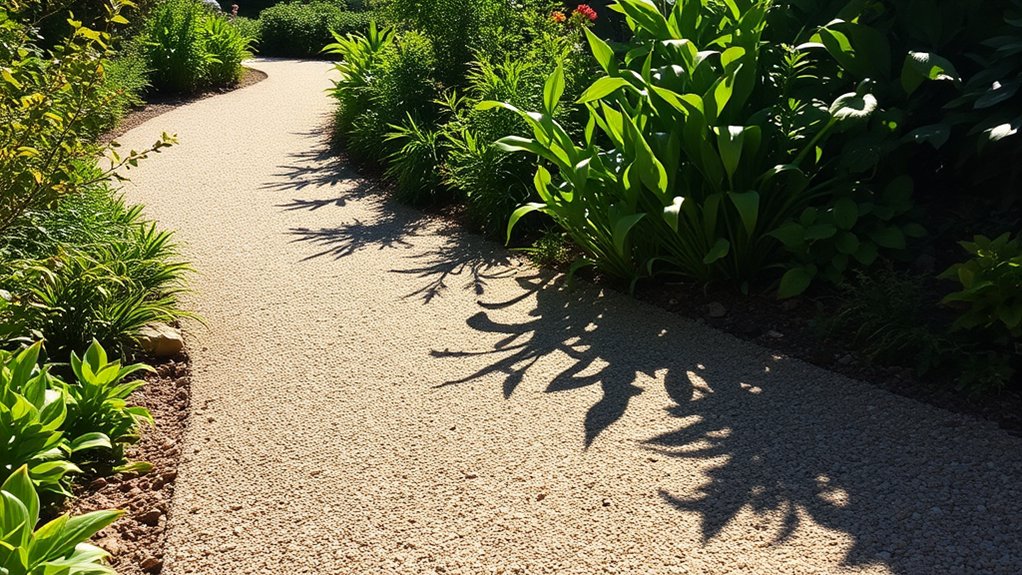
Maximising Your Resin-Bound Surface Life
Essential environmental adaptations for a lasting resin-bound gravel surface:
- UV Protection: Select UV-stable resins and aggregates to maintain colour and prevent yellowing, particularly important for south-facing driveways and patios.
- Temperature Management: British weather’s freeze-thaw cycles can strain surfaces. Quality resin blends cope better with our typical winter-to-spring temperature shifts.
- Weather Protection: Your surface must handle everything from summer downpours to winter sleet. Proper installation depth and aggregate mix are crucial.
- Effective Drainage: SUDS-compliant drainage prevents standing water and extends surface life. A permeable sub-base lets rainfall filter naturally into the ground, reducing flood risk.
Essential Maintenance Practices for Resin-Bound Surfaces
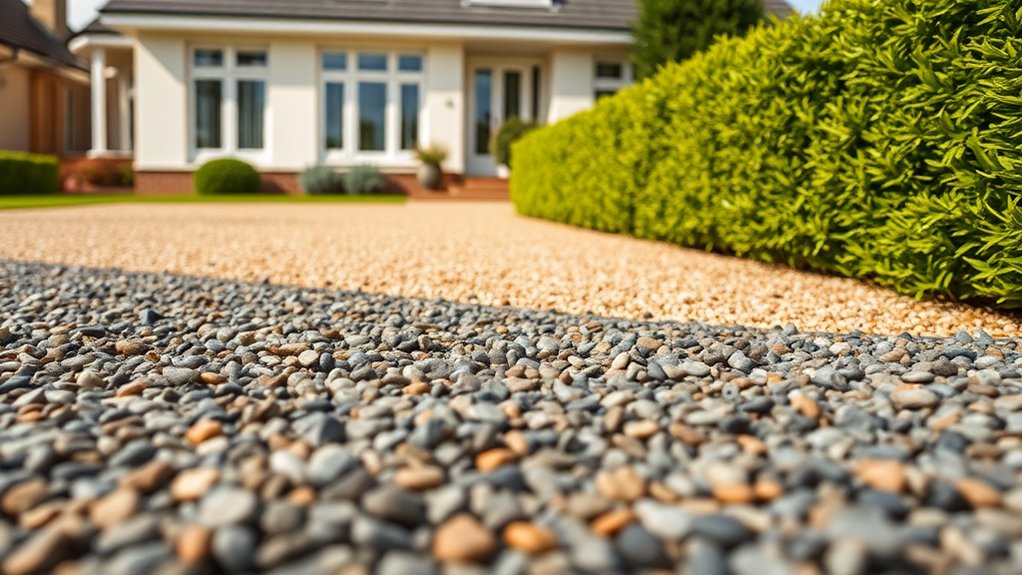
Regular cleaning and upkeep are vital for resin-bound surfaces in the UK climate.
Check for cracks or loose stones monthly, particularly after harsh weather. A good sweep and occasional pressure wash will shift debris and prevent moss build-up – common issues in Britain’s damp conditions.
Reseal the surface every 3-4 years, much like you’d treat a wooden deck. A well-maintained resin surface can last 15-20 years, making it a sound investment for driveways and paths.
Routine Cleaning Techniques
Keeping Your Resin-Bound Surface Clean
A well-maintained resin-bound driveway or path stays smart and lasts longer. Follow these straightforward cleaning steps:
- Weekly Sweep: Work a stiff brush in circles to shift everyday dirt and leaves – just like sweeping your patio.
- Light Water Clean: Give it a gentle rinse with the garden hose to wash away loose bits – avoid blasting it.
- Sort Spills Straight Away: Tackle stains with washing-up liquid and water before they soak in.
- Deep Clean: Use a pressure washer once or twice yearly – keep it 20cm from the surface, about a ruler’s length.
Remember: Harsh scrubbing or powerful jets can damage the surface, so gentle but regular cleaning works best.
Resealing and Repair Guidelines
Maintaining Resin-Bound Surfaces
Regular checks and proper maintenance ensure your resin-bound surface stays in top condition. A simple maintenance schedule helps spot issues before they worsen:
| Task | Frequency | Method |
|---|---|---|
| Visual Inspection | Monthly | Look for cracks and stains |
| Resealing | Every 2-5 years | Apply approved sealant |
| Minor Repairs | As needed | Use resin patch kits |
| Weed Control | Monthly | Remove by hand or use weedkiller |
| Algae/Moss Treatment | Every 3 months | Apply specialist paving cleaner |
Like your car’s MOT, routine checks prevent costly repairs later. Most issues, such as small cracks or stains, are easily fixed if caught early. For best results, always use manufacturer-recommended products and consult a professional for extensive repairs.
Cost Considerations: Initial vs. Long-Term Investment
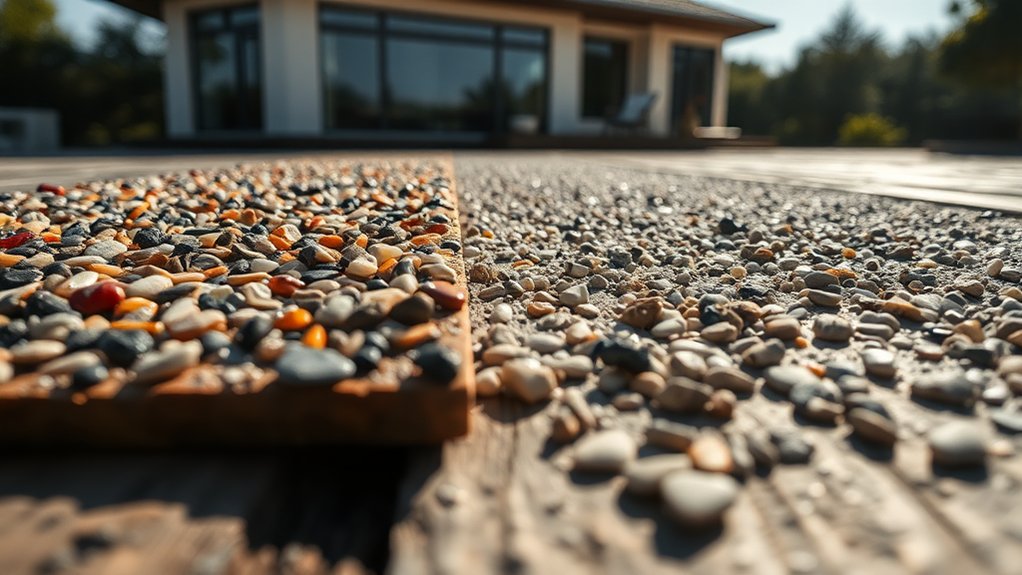
Evaluating Resin-Bound Gravel: Cost vs Value
The initial cost of resin-bound gravel ranges from £4.85 to £7.30 per square metre, but its long-term benefits often outweigh this upfront investment.
A proper cost breakdown shows significant savings through reduced maintenance and repairs over time.
Key financial benefits:
- Tough wearing and long-lasting
- Low maintenance requirements
- Keeps its look without needing resurfacing
- Weather-resistant, reducing repair costs
For example, a typical driveway might need resurfacing every 3-5 years with standard materials, whilst resin-bound surfaces can last 15-20 years with basic upkeep.
The maths often favours resin-bound gravel as a sensible investment compared to traditional options.
Design Trends in Resin-Bound Gravel
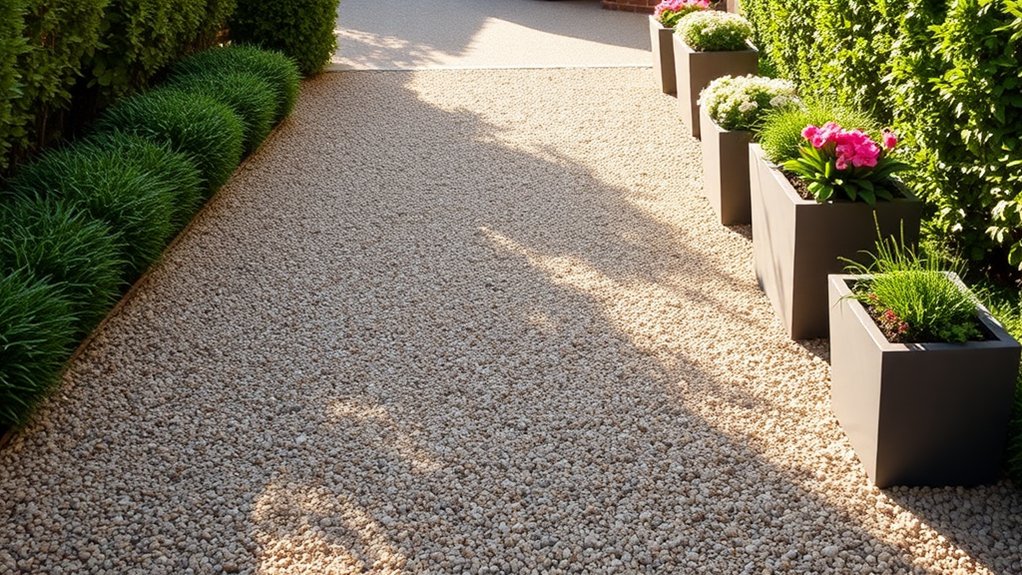
Modern Trends in Resin-Bound Gravel
The rise in demand for smart, functional outdoor spaces has shaped current resin-bound gravel trends across the UK. Today’s designs favour contemporary colours like grey, charcoal and natural earth tones that blend perfectly with British gardens and driveways.
| Trend Category | Description |
|---|---|
| Popular Colours | Grey, charcoal, natural tones |
| Permeability & Eco | Enhanced drainage, environmentally sound |
| Aesthetic Appeal | Smooth finish, modern look |
| Customisation | Bespoke blends to match property style |
These design choices boost property kerb appeal whilst supporting sustainable landscaping. Resin-bound surfaces offer a practical, stylish solution that maintains its appearance through Britain’s varied weather conditions.
Customization Options to Suit Your Style
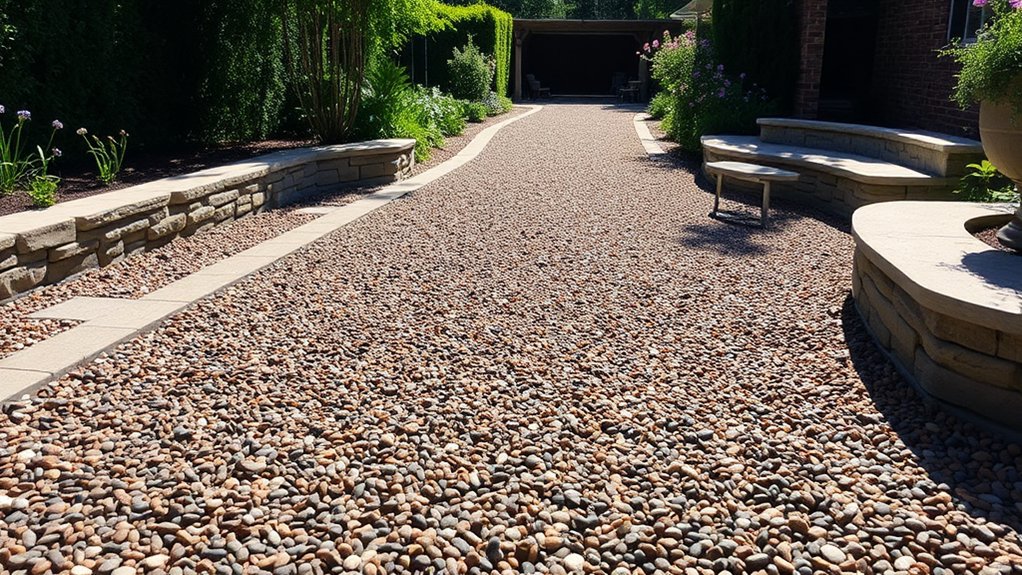
Resin-bound gravel offers brilliant customisation choices to make your outdoor space truly yours. Choose from:
- Colour options to match your home’s existing look, from warm earth tones to contemporary greys
- Bespoke patterns incorporating your preferred designs or family crests using different coloured stones
- Surface textures created by mixing stone sizes, from fine gravel to larger aggregates
- Border designs to neatly frame your driveway or garden path
Whether you fancy a classic Cotswold stone look for your country home or a modern slate finish for your urban property, these options ensure your surface stays stylish for years to come.
Mix and match to create exactly what you want – no need to settle for ordinary.
Patterns and Textures: Making a Statement
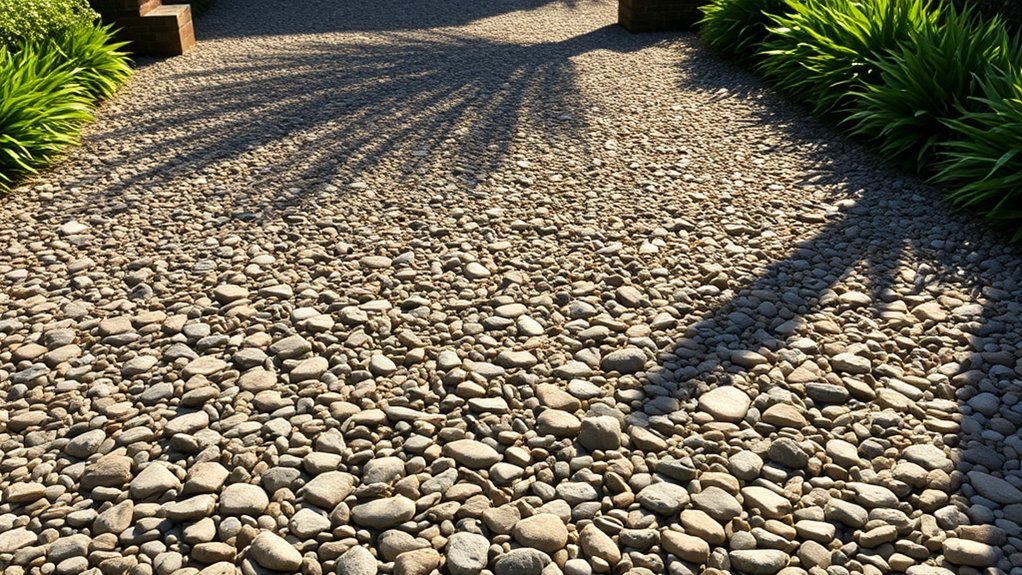
Making your outdoor space distinctive is simple through clever use of patterns and textures.
Geometric designs with crisp lines and shapes create a modern look that’s particularly popular in British gardens. Think symmetrical paving layouts or circular lawn borders – these classic patterns work brilliantly for contemporary spaces whilst maintaining order.
Natural patterns, like floral motifs or leaf designs, help soften hard landscaping and create a more relaxed feel. You’ll find these particularly effective in cottage-style gardens or around water features.
Texture adds another dimension – smooth stone patios contrast nicely with rough cobbles or gravel paths. Yorkshire stone, for instance, offers both visual interest and practical durability.
Mix and match these elements thoughtfully, and you’ll craft an outdoor space that’s both eye-catching and welcoming, perfect for the British climate and lifestyle.
Enhancing Property Value With Resin-Bound Gravel
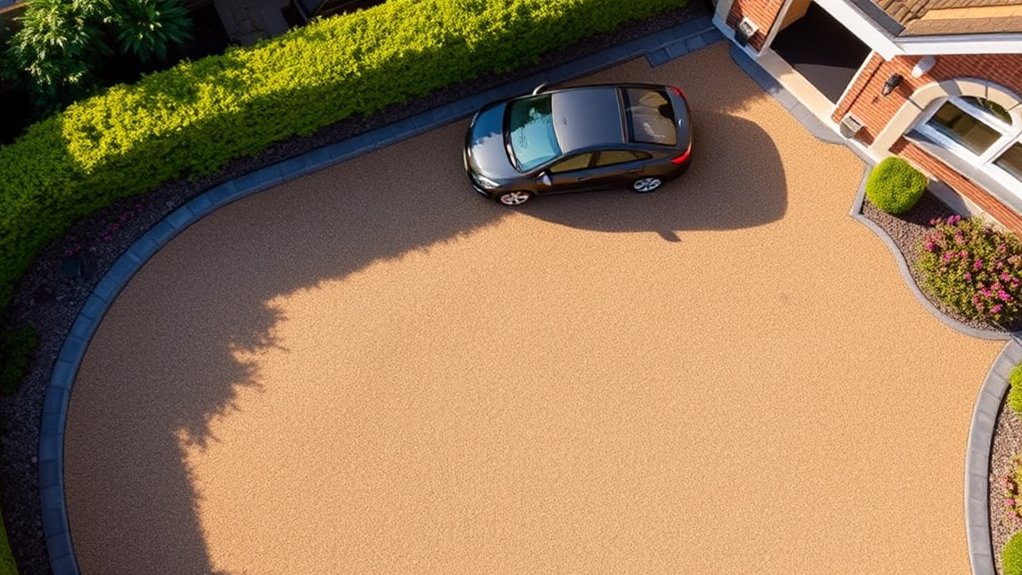
Resin-Bound Gravel: A Smart Investment for Your Property
A well-designed outdoor space with resin-bound gravel doesn’t just look good – it adds genuine value to your home. This modern surfacing choice is becoming increasingly popular with UK homebuyers.
Key advantages:
- Property value boost: Quality resin-bound installations typically increase home value by up to 20%
- Better kerb appeal: Creates a smart, professional finish that catches the eye of potential buyers
- Hassle-free upkeep: Requires minimal maintenance – just occasional sweeping and pressure washing
- Environmental benefits: Permeable surface helps with drainage and flood prevention, meeting UK planning requirements
Whether you’re planning to sell or simply improving your home, resin-bound gravel offers excellent returns on investment whilst enhancing your property’s marketability.
Frequently Asked Questions
How Does Resin-Bound Gravel Compare to Traditional Paving Materials?
Resin-bound gravel outperforms traditional paving in several key areas. It’s highly durable, needs minimal upkeep and offers excellent grip in wet conditions – a major plus for British weather. Though concrete or block paving might cost less upfront, resin’s lasting performance makes it better value across its lifetime, much like choosing a quality raincoat over a cheap one that needs yearly replacement.
Can Resin-Bound Surfaces Be Installed Over Existing Pavement?
Yes, resin-bound surfaces can be laid over existing pavement, provided it’s structurally sound. The process requires proper preparation of the base surface to ensure a solid bond. When done correctly, this overlay method offers a cost-effective way to revamp driveways, patios and walkways whilst adding value to your property.
What Are the Typical Colors Available for Resin-Bound Gravel?
Typical resin-bound gravel colours range from natural earth tones and warm browns to sleek greys and striking reds. The varied textures complement these shades brilliantly, making them suitable for both contemporary and traditional British gardens and driveways.
How Long Does the Installation Process Usually Take?
A typical driveway installation takes 3-4 days to complete. The exact duration depends on factors like the driveway size and British weather conditions. Whilst a small front drive might be finished in two days, larger projects or those requiring additional groundwork may need up to a week.
Is Resin-Bound Gravel Suitable for Commercial Applications?
Resin-bound gravel works brilliantly for commercial spaces across the UK. The surface holds up well under heavy foot traffic, such as in shopping centres and office car parks, whilst offering excellent grip in our wet British weather. It’s particularly practical for businesses as it needs minimal upkeep and looks smart year-round, blending nicely with both modern and traditional buildings.
Conclusion
Selecting the right resin-bound gravel finish is crucial for any British outdoor space. Focus on premium aggregates and classic colour schemes that complement traditional UK architecture. Natural stone blends, like Cotswold or Yorkshire cream, offer timeless appeal that won’t date. Smart choices in materials and professional installation not only boost your property’s kerb appeal but also ensure lasting durability through Britain’s varied weather conditions. Consider local design preferences – whilst grey and beige remain popular in urban settings, warmer tones often suit country homes better. The key is choosing a finish that matches both your property’s character and the surrounding landscape.
